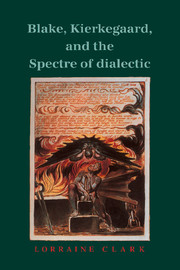Book contents
- Frontmatter
- Contents
- Acknowledgements
- A note on texts and abbreviations
- Introduction
- 1 The Spectre and the logic of error
- 2 The Spectre as Kierkegaard's concept of dread
- 3 The Spectre and the line of life
- 4 Mastered irony as the ground of human community
- 5 Irony and authority
- Conclusion. Los and the Spectre: master and slave in the labor of the negative
- Notes
- Bibliography
- Index
5 - Irony and authority
Published online by Cambridge University Press: 19 January 2010
- Frontmatter
- Contents
- Acknowledgements
- A note on texts and abbreviations
- Introduction
- 1 The Spectre and the logic of error
- 2 The Spectre as Kierkegaard's concept of dread
- 3 The Spectre and the line of life
- 4 Mastered irony as the ground of human community
- 5 Irony and authority
- Conclusion. Los and the Spectre: master and slave in the labor of the negative
- Notes
- Bibliography
- Index
Summary
Los reads the Stars of Albion
The Spectre reads the Voids between the Stars
Blake, JerusalemWhat Tarquinius Superbus spoke in his garden with the poppies was understood by his son, but not by the messenger.
Hamann; epigraph to Fear and TremblingI never in all my conversations with him could feel the least justice in calling him insane; he could always explain his paradoxes when he pleased, but to many he spoke so that ‘hearing they might not hear.’
John Linnell (artist friend of Blake)Decisiveness is precisely the eternal protest against all fictions.
Johannes Climacus, Concluding Unscientific PostscriptBlake's spiritual friends and brothers converse together in “Visionary forms dramatic,” and “every Word and Every Character Is Human.” But their experience of mutual interchange and intellectual commingling is largely foreign to the majority of Blake's readers, at least when they are reading Blake. His notorious obscurity, far from allowing such immediate (or unmediated) exchange, has rather demanded, as the proliferating Blake industry bears witness, the mediation of a host of critics and an ever-expanding interpretive apparatus.
Hypotheses about the reasons for this obscurity are many. Blake was mad, or close to it, increasingly entangled in the Urizenic meshes of his own idiosyncratic and finally private symbolic net of religion; he was a mystic, irrationally compiling esoterica from disparate and often contradictory occult sources in the conviction that all pointed to the same ultimately ineffable and wordless truth; he feared censorship, in England's politically unstable and excessively repressive climate following the French revolution, deciding that “deep dissimulation is the only defense an honest man has left;” he wished pedagogically to force his readers into an active grappling with his text, to “rouze [their] faculties to act,” deliberately speaking in riddles and paradoxes so that “hearing they might not hear.”
- Type
- Chapter
- Information
- Blake, Kierkegaard, and the Spectre of Dialectic , pp. 147 - 173Publisher: Cambridge University PressPrint publication year: 1991



